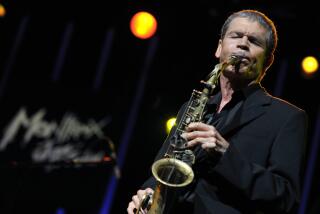DAVID SANBORN : Saxophonist Enveloped in a New Acoustic Glow
Alto saxophonist David Sanborn feels it’s his turn to be kinder and gentler--musically speaking.
On the New Yorker’s new album, “Another Hand,” there isn’t even one of the rhythm-heavy funk-jazz groove tunes for which he is best known. The music--mostly ballads gathered from a variety of genres including jazz, pop, folk, country and world beat--has a predominantly soft glow to it.
It’s an approach that Sanborn, who plays Tuesday at the Wiltern Theatre, has been thinking about for almost five years.
“I realized I was losing inspiration for the R&B; and fusion grooves I was recording,” Sanborn said recently. “I didn’t feel I had anything new to bring to them.”
Sanborn, 45, felt a new direction emerging when he was exposed to a multitude of musical styles when he hosted the “Night Music” program on NBC-TV in 1989 and 1990.
“I got tired of fighting the synthesizers, the electric bass,” he continued. “To play funk or R&B; on the saxophone, you have to play at high decibel levels and that volume eliminates a big part of the dynamic range of the horn, particularly the soft and medium-soft side.”
So Sanborn recorded primarily with acoustic musicians on the new Elektra/Musician album. Guest artists, including Bill Frisell and Marcus Miller, perform on electric guitar and bass on the package, but they work in a subdued manner.
The album sounds unlike any previous Sanborn effort. “When you have acoustic bass and piano, that’s going to change everything,” he said. “You leave different kinds of space, employ different dynamics.”
At the Wiltern, Sanborn will be accompanied by such jazz notables as pianist Kenny Kirkland, bassist Charlie Haden, drummer Al Foster and percussionist Don Alias. Despite this company and being listed in the New Grove Dictionary of Jazz, Sanborn is reluctant to call himself a jazz musician.
“You have to come up in that background, play that music, and I haven’t,” said the saxophonist, who achieved early notoriety for his work with the Paul Butterfield Blues Band in the late ‘60s. Rather, he’d call himself “an improvising saxophonist.” He added: “That’s what I do. I make stuff up.”
More to Read
The biggest entertainment stories
Get our big stories about Hollywood, film, television, music, arts, culture and more right in your inbox as soon as they publish.
You may occasionally receive promotional content from the Los Angeles Times.









